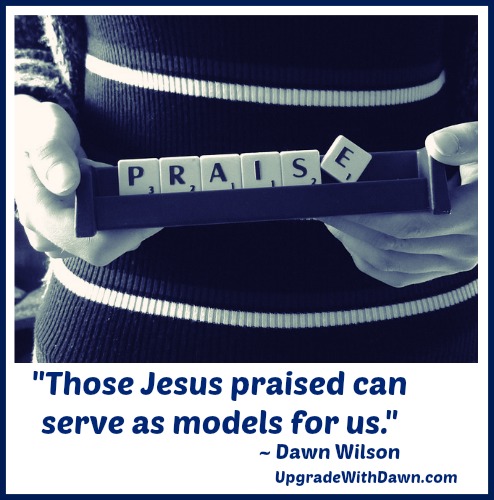Trust the Blueprints
Kolleen Lucariello speaks into women's lives in engaging, practical ways. In this Relationship with God UPGRADE, she envisions God as a faithful Contractor, accomplishing His purposes in our lives.

"Sometimes full understanding remains a mystery until the contractor completes the work," Kolleen says. "When you can’t fully catch the vision—you watch, wait, and trust the one with the blueprints."
I (Dawn) have studied blueprints before. They can be so complicated! I've wished I could crawl inside a contractor's mind to figure out what he sees sometimes that I'm not seeing.
Kolleen continues . . .
Every summer our house undergoes a little upgrade. This year, a simple front step soon became a front-porch-walkway-landscaping project for my husband and I, filling our front yard with piles of dirt and sand, black tarps, pavers and lumber.
“I can’t wait to see it finished,” our daughter commented during one visit, “It’s going to look so nice.”
The next comment came from our five-year-old granddaughter: “I can’t wait to see it finished, cause then I will finally understand what you are doing.”
What seemed obvious to us was not to her.
I can relate. Don’t tell her, but I’ve been confused by some of her art projects, too. Some projects only make sense to the one with the plan.
I agree with her. It’s not always easy to catch the vision until the project is complete. I share the same limitations and I find myself struggling to understand when seasons of difficulty hammer away.
I find myself trying to catch the vision for God’s plan every time life becomes paved with blinding unknowns and overwhelming struggles. This is when I admit “I can’t wait to see this finished, Lord, because then perhaps, I will understand what You are doing.”
Well, I hope to understand, or it might be—"Please, Lord help me understand"
Years ago, we lost our brother-in-law in a car accident.
I became angry with God for what I perceived as unfair and unjust. I didn’t really care to have understanding about what God was doing; I thought He was just being cruel.
I recognize now how God used this tragedy to lead my husband and I to understand our need for salvation. What might have destroyed our faith, God used to cement it instead.
Several years later, we lost a very close friend in another car accident.
The loss was devastating for us, but we knew God as a Contractor was able to build something good out of the destruction.
When the pain was great I found myself repeating, “I can’t wait to see the good at the end of this, God, because right now, I don’t understand the why behind what just happened.”
I would remind myself of what I knew to be true about God:
- You know the end from the beginning (Isaiah 46:10).
- You are deeply concerned about us, and are able to turn this bad into something good (Romans 8:28).
Unlike the first time, I didn’t get mad at Him. I didn’t turn bitter.
I refused the invitation to believe God was cruel.
I just imagined my head on His chest while I wept—grateful that He understood my heartbreak, and that I now understood His comfort.
Life is unpredictable. Perhaps this is why the Psalmist reminds us to put our trust in, and reliance on the Lord, rather than relying on our own insight and understanding (Proverbs 3:5).
With my hazy insight and limited understanding, trusting in—while relying on—Jesus is the only option that offers me any peace when life becomes unsettled. After all, He promised that in Him we would have perfect peace; but He also forewarned us of tribulation, distress and suffering, too.
“Be courageous,” He said. “I have overcome the world” (John 16:13).
Jesus is predictable when life is not.
God is the Contractor who began a glorious work within you, and He’s the One who will faithfully continue the process of building you into His likeness—adding a few finishing touches here and there (Philippians 1:6).
When you lack understanding, trust the Lord as you do three things.
1. Rejoice that He sees you.
“I will rejoice and be glad in Your steadfast love, because You have seen my affliction; You have taken note of my life’s distresses” (Psalms 31:7 AMP).
Your distress has been noted!
2. Focus your thoughts.
“You will keep in perfect peace all who trust in you, all whose thoughts are fixed on you” (Isaiah 26:3 NLT).
3. Find rest.
Jesus said,
“Come to me, all of you who are weary and carry heavy burdens, and I will give you rest” (Matthew 11:28 NLT).
Unload your troubles onto Him.
Sometimes you need to patiently wait, watch the process, and trust something good can come from the mess you’re staring at now.
Even when you don’t understand His vision.
Where in your life are you struggling to understand what God is doing? How can you trust God's "blueprint" for your life and find rest, peace and even joy in Him?
Kolleen Lucariello, #TheABCGirl, is the author of the devotional book, The ABC's of Who God Says I Am; and as a speaker, she speaks into women's lives "one letter at a time."
Am; and as a speaker, she speaks into women's lives "one letter at a time."  Kolleen and her high school sweetheart, Pat, reside in Central New York. She's a mother of three married children and Mimi to five incredible grandkids—with one more on the way! For more information about Kolleen, visit her website.
Kolleen and her high school sweetheart, Pat, reside in Central New York. She's a mother of three married children and Mimi to five incredible grandkids—with one more on the way! For more information about Kolleen, visit her website.
Graphic adapted, courtesy of Classically Printed at Pixabay.
 Post a Comment → Posted on
Post a Comment → Posted on  Thursday, September 5, 2019 at 8:22AM
Thursday, September 5, 2019 at 8:22AM 












